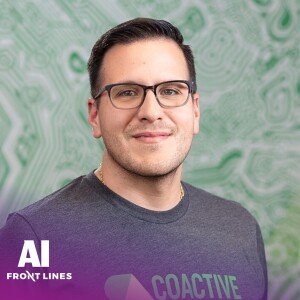BUILDERS
Welcome to BUILDERS — the show about how founders get new technology adopted.
Each episode features a founder on the front lines of bringing new tech to market, sharing how they broke into their industry, earned early believers, built credibility, and unlocked real technology adoption.
BUILDERS is part of a network of 20 industry-specific shows with a library of 1,200+ founder interviews conducted over the past three years.
For the full network, visit FrontLines.io.
Brought to you by:
www.FrontLines.io/FounderLedGrowth — Founder-led Growth as a Service. Launch your own podcast that drives thought leadership, demand, and most importantly, revenue.
Episodes

Wednesday Feb 26, 2025
Wednesday Feb 26, 2025
Ansel Health is revolutionizing supplemental health insurance by automating claims processing and delivering higher value to consumers. In a recent episode of Category Visionaries, I sat down with Veer Gidwaney, CEO and Founder of Ansel Health, to learn about the company's journey from identifying a critical market need to securing Fortune 500 clients and achieving an industry-leading NPS in the high 80s.
Topics Discussed:
The staggering problem of medical debt affecting 100 million Americans
Evolution of health insurance costs and diminishing consumer value
Ansel's approach to redefining supplemental insurance through automation
The importance of product-market fit in insurance products
Building a platform-based solution that powers other insurance companies
The process of validating ideas in a heavily regulated industry
GTM Lessons For B2B Founders:
Focus on market expansion through strategic partnerships: Ansel identified that the supplemental insurance market could be 4-5x larger with the right product. Instead of competing head-on with incumbents, they created a platform that enables established insurance companies to offer their own versions of Ansel's product, leveraging existing distribution channels and brand credibility.
Build for ownership and adaptability: Gidwaney emphasized the importance of owning their technology platform rather than relying on third-party solutions. This decision enables rapid adaptation to partner needs and efficient automation implementation. They balanced this by building on Salesforce's infrastructure, combining control with scalability.
Validate before building in regulated industries: When entering regulated markets, Gidwaney's team first validated market interest through conversations with industry experts, then confirmed regulatory feasibility. This two-step validation process ensures resources aren't wasted on technically unfeasible solutions, regardless of market demand.
Prioritize automation for customer experience: Ansel achieved a high NPS in an industry known for poor customer satisfaction by automating 75% of claims processing. This removes friction from the customer experience and delivers on the promise of "the best insurance product is one you don't have to think about."
Align investors with mission and values: For products aimed at solving significant social problems, Gidwaney stressed the importance of finding investors who understand and support the mission. This alignment becomes crucial when making decisions that prioritize long-term impact over short-term gains.
//
Sponsors:
Front Lines — We help B2B tech companies launch, manage, and grow podcasts that drive demand, awareness, and thought leadership.
www.FrontLines.io
The Global Talent Co. — We help tech startups find, vet, hire, pay, and retain amazing marketing talent that costs 50-70% less than the US & Europe.
www.GlobalTalent.co

Tuesday Feb 25, 2025
Tuesday Feb 25, 2025
Supercede is revolutionizing the reinsurance industry with purpose-built software solutions, addressing a critical gap in enterprise technology. With $21.6 million in funding, Supercede is building specialized tools for an industry that has historically relied on generic enterprise software or inefficient in-house solutions. In this episode of Category Visionaries, I sat down with Jerad Leigh, CEO and Co-Founder of Supercede, to explore how they're bringing innovation to what he calls the "unsexy" but crucial world of reinsurance technology.
Topics Discussed:
The opportunity in building "boring" enterprise software for reinsurance
Why the reinsurance industry has been underserved by technology
How Supercede leverages content marketing and community building
The role of authenticity in B2B marketing and brand building
Balancing professional credibility with creative marketing in a serious industry
The evolution of their podcast strategy and content creation
GTM Lessons For B2B Founders:
Embrace the unsexy: Jerad emphasizes that some of the best business opportunities exist in "boring" enterprise spaces that aren't getting attention from flashy consumer or AI startups. B2B founders should look for valuable problems to solve in industries that others might overlook due to their perceived lack of excitement.
Build vertical-specific solutions: Generic enterprise software often falls short for specialized industries. Jerad notes that while solutions like Salesforce are powerful, there's significant value in building purpose-built solutions that address industry-specific workflows and challenges. B2B founders should deeply understand their vertical's unique needs rather than trying to force-fit horizontal solutions.Lead with authenticity in B2B: Despite operating in a serious industry,
Supercede successfully employs creative marketing approaches like meme calendars with personalized notes. Jerad argues that authentic, personality-driven content can work well even in traditional B2B sectors - the key is finding the right balance between professional credibility and engaging creativity.
Leverage content for category leadership: Supercede's podcast strategy demonstrates how content can establish category leadership. By creating the first reinsurance-focused podcast and consistently delivering valuable content, they've built relationships with senior industry leaders and helped educate the next generation of professionals. B2B founders should consider how content can help them own their category's conversation.
Take calculated marketing risks early: Jerad advises that early-stage companies have more freedom to experiment with creative marketing approaches since they have less to lose. He suggests using this period to find an authentic voice and build a core group of passionate supporters rather than trying to appeal to everyone with "safe" messaging.
//
Sponsors:
Front Lines — We help B2B tech companies launch, manage, and grow podcasts that drive demand, awareness, and thought leadership.
www.FrontLines.io
The Global Talent Co. — We help tech startups find, vet, hire, pay, and retain amazing marketing talent that costs 50-70% less than the US & Europe.
www.GlobalTalent.co

Tuesday Feb 25, 2025
Tuesday Feb 25, 2025
XL Batteries is pioneering a revolutionary approach to grid-scale energy storage, leveraging organic molecules derived from oil and gas feedstocks to create long-duration batteries that can operate for 50+ years. Founded in 2019, the company has raised $20 million to develop their non-lithium flow battery technology that aims to enable the transition to renewable energy by solving the critical challenge of intermittent power generation from solar and wind sources. In this episode of Category Visionaries, Thomas Sisto shares insights from shipping their first commercial unit and discusses their vision for transforming the energy storage landscape.
Topics Discussed:
The $4 trillion market opportunity in grid-scale energy storage
Technical breakthrough in organic molecule-based flow batteries
Evolution from laboratory discovery to first commercial shipment
Advantages over traditional lithium and vanadium flow batteries
Strategic approach to building world-class technical teams Commercial product development and scaling challenges
GTM Lessons For B2B Hardware Founders:
Build an elite technical team early: Thomas emphasized the importance of bringing in experienced leaders from successful companies in adjacent spaces. He recruited the co-founder/CTO of A123 Systems (largest battery IPO of 2009) as chief commercialization officer and executives from Pfizer and Plug Power. This mix of startup scaling experience and deep technical expertise helped them avoid costly mistakes and technical debt.
Start with proven architectures: Rather than inventing entirely new systems, XL Batteries focused on innovating within established frameworks. They used the proven flow battery architecture but replaced expensive vanadium/sulfuric acid with organic molecules in saltwater. Thomas explained, "We haven't invented a new mousetrap. It's an old mousetrap. The key for us is to just really drive cost out of it."
Focus relentlessly on cost in utility markets: Thomas highlighted that unlike consumer products where premium pricing can work, utility products must prioritize cost and reliability above all else. "Energy and electricity is hidden... you just want your lights to work and you don't want to pay more than 15 cents per kilowatt hour." This drives every product design decision.
Leverage existing industry infrastructure: By using organic molecules from oil and gas feedstocks, XL Batteries tapped into established supply chains and manufacturing capabilities. This reduced scaling risk compared to approaches requiring entirely new manufacturing processes or rare materials.
Time market entry carefully: Despite having revolutionary technology, XL Batteries waited until they had a fully integrated demonstration unit before pursuing major marketing efforts. Thomas noted they're only now approaching the "tipping point" for marketing as they near commercial product availability.
//
Sponsors:
Front Lines — We help B2B tech companies launch, manage, and grow podcasts that drive demand, awareness, and thought leadership.
www.FrontLines.io
The Global Talent Co. — We help tech startups find, vet, hire, pay, and retain amazing marketing talent that costs 50-70% less than the US & Europe.
www.GlobalTalent.co

Tuesday Feb 25, 2025
Tuesday Feb 25, 2025
Routable is revolutionizing accounts payable automation by bridging the gap between finance teams and engineering requirements. With $100 million in funding, Routable has built a platform that handles everything from basic invoice processing to complex mass payouts, focusing on companies where AP is central to their business model. In this episode of Category Visionaries, I sat down with Omri Mor, CEO and Co-Founder of Routable, to explore how they're transforming a market where only 3.4% of potential customers currently use AP automation solutions.
Topics Discussed:
Evolution from in-house solution to scalable AP automation platform
The state of AP automation adoption and market opportunity
Routable's approach to product development and feature prioritization
The importance of customer feedback in shaping product roadmap
Strategic pivot from SMB to mid-market and enterprise customers
Building trust in financial technology through customer referrals
Integration of AI and automation in financial workflows
GTM Lessons For B2B Founders:
Find your wedge through empathy: Omri and his co-founder succeeded initially because they had built similar solutions internally and deeply understood the pain points. They approached customers with genuine curiosity and empathy, spending 45-60 minutes just listening about what wasn't working in their finance departments. B2B founders should leverage their authentic experience and empathy to build initial trust.
Focus on critical pain points: Rather than trying to change established workflows entirely, Routable looks for specific pain points as entry points - like payment failures that take 30-45 minutes to correct manually. B2B founders should identify acute pain points that provide natural openings for their solution, rather than trying to force wholesale process changes.
Build trust through demonstration: In the mid-market and enterprise space, Routable found success by showing rather than telling. They implement a "try before you buy" approach with customers' own data, demonstrating their capabilities concretely rather than just making sales promises. B2B founders should prioritize proving their value through actual demonstrations over sales rhetoric.
Leverage customer feedback channels: Routable built in-product feature request capabilities and maintains a dedicated product feedback channel where customer conversations are shared and discussed. B2B founders should create systematic ways to capture, share, and act on customer feedback across the organization.
Strategic pricing for growth: One of Routable's most important GTM decisions was strategically increasing prices to reflect their value and improve unit economics, even though it meant moving away from smaller customers. B2B founders should price their products to enable sustainable growth and continued investment in product development.
//
Sponsors:
Front Lines — We help B2B tech companies launch, manage, and grow podcasts that drive demand, awareness, and thought leadership.
www.FrontLines.io
The Global Talent Co. — We help tech startups find, vet, hire, pay, and retain amazing marketing talent that costs 50-70% less than the US & Europe.
www.GlobalTalent.co

Friday Feb 21, 2025
Friday Feb 21, 2025
VitVio is transforming surgical operations by deploying AI-powered camera systems in operating rooms to automate administrative tasks and optimize team orchestration. In this episode of Category Visionaries, Thomas Knox, CEO & Founder of VitVio shares his journey from scaling hypergrowth startups like Kiwi.com and IFI (a leader in autonomous store technology) to founding VitVio after a personal loss sparked his mission to make meaningful impact in healthcare. Despite being less than a year old, VitVio has already secured partnerships with leading institutions like the Royal Orthopedic Hospital and is in discussions with 9 of the top 15 US hospitals.
Topics Discussed:
Evolution from autonomous store technology to healthcare operations
Strategic approach to entering the challenging healthcare market
VitVio's computer vision and AI technology deployment in operating rooms
Expansion strategy from UK's NHS to the US healthcare market
Building trust and credibility in the healthcare industry
Vision for creating an operating system for surgical operations
GTM Lessons For B2B Founders:
Target decision-makers through their influencers: Knox found success by approaching top surgeons rather than hospital executives directly. Surgeons were more receptive to initial conversations and could effectively champion the solution internally. Healthcare startups should identify and engage key opinion leaders who can open doors and drive adoption.
Time market entry strategically: VitVio's launch coincided with hospitals facing unprecedented pressure to innovate due to post-COVID challenges, staff shortages, and margin pressure. Knox emphasizes that timing can dramatically impact sales velocity - the same solution might struggle to gain traction in a different market context.
Validate commitment through paid pilots: While hospitals readily accept free pilots, Knox insisted on paid engagements to ensure genuine commitment and likelihood of expansion. B2B founders should consider using paid pilots as a qualification tool, even if it means slower initial traction.
Segment prospects based on readiness signals: Knox advises targeting hospitals with recent cash infusion or strong profitability, while avoiding those undergoing major technical implementations like EHR changes. B2B founders should develop clear criteria for identifying prospects most likely to move quickly.
Build reference customers strategically: VitVio prioritized winning top-tier US hospitals, knowing their validation would accelerate sales cycles with smaller institutions from 12+ months to 3-6 months. B2B founders should identify which customer logos will most effectively drive market confidence and focus resources accordingly.
//
Sponsors:
Front Lines — We help B2B tech companies launch, manage, and grow podcasts that drive demand, awareness, and thought leadership.
www.FrontLines.io
The Global Talent Co. — We help tech startups find, vet, hire, pay, and retain amazing marketing talent that costs 50-70% less than the US & Europe.
www.GlobalTalent.co

Thursday Feb 20, 2025
Thursday Feb 20, 2025
CoactiveAI is pioneering the multimodal application platform (MAP) category, enabling companies to unlock value from their visual content through AI-powered search, tagging, and analytics. In this episode of Category Visionaries, I sat down with William Gaviria Rojas, Field CTO & Co-Founder of CoactiveAI to discuss his inspiring journey from Colombian refugee to MIT graduate and successful founder, as well as CoactiveAI's vision for transforming how enterprises work with visual content.
Topics Discussed:
William's journey from Colombian refugee to MIT and entrepreneurship
The founding story of CoactiveAI and early backing from a16z
Evolution of the AI landscape pre and post-ChatGPT
Creating the multimodal application platform category
Building AI applications for media and entertainment companies
Challenges and opportunities in trust and safety use cases
Going from prototypes to production AI implementations
GTM Lessons for B2B Founders:
Category Creation Through Customer Discovery: Rather than trying to serve every vertical initially, CoactiveAI went through a deliberate "market annealing" process. Through extensive customer conversations, they discovered that media and entertainment companies had the most complex content challenges and could derive the most immediate value from their technology. Focus on finding the intersection of your technical capabilities and the markets where you can have the biggest impact.
Technical Differentiation in a Crowded Market: When the AI space became crowded post-ChatGPT, CoactiveAI maintained their edge by emphasizing their deep technical capabilities built since 2021. William notes, "We weren't some sort of light wrapper around OpenAI or ChatGPT." In emerging technology markets, having genuine technical differentiation can help you stand out from opportunistic newcomers.
Enterprise Partnership Strategy: Rather than pursuing transactional sales, CoactiveAI focuses on building true partnerships with enterprise customers. As William explains, "If you just come to somebody like a vendor and that's really all you're kind of doing, this is just kind of a transactional sale." Instead, they invest in deeply understanding customer pain points and collaborating on solutions, which has led to successful deployments with major companies like NBCUniversal and Thomson Reuters.
Evolving Value Proposition: William observed that while 2024 was about prototypes and proofs of concept, 2025 is focused on demonstrating real ROI from AI implementations. He emphasizes the importance of having clear customer success stories and ROI metrics as the market matures. B2B founders should anticipate and adapt to these shifts in buyer expectations.
Vision-Driven Culture: CoactiveAI published their culture on GitHub as one of their first actions, emphasizing that success isn't just about business metrics but also about how you achieve that success. William's vision includes building "ladders" for the next generation of diverse founders. This clear mission has helped attract talent and align the team around common goals.
//
Sponsors:
Front Lines — We help B2B tech companies launch, manage, and grow podcasts that drive demand, awareness, and thought leadership.
www.FrontLines.io
The Global Talent Co. — We help tech startups find, vet, hire, pay, and retain amazing marketing talent that costs 50-70% less than the US & Europe.
www.GlobalTalent.co

Tuesday Feb 18, 2025
Tuesday Feb 18, 2025
Ravin AI is revolutionizing vehicle damage assessment through AI-powered remote inspection technology. With $35 million in funding, Ravin AI has evolved from a Shell innovation project to a leading provider of AI-powered vehicle inspection solutions for insurance companies and fleets. In this episode of Category Visionaries, we spoke with Eliron Ekstein, CEO & Co-Founder of Ravin AI about the company's journey from experimental technology to enterprise-grade solution, including their strategic pivots during COVID and their approach to building critical partnerships in the insurtech space.
Topics Discussed:
Evolution from experimental technology to enterprise solution
Strategic market pivots from car rental to insurance
Enterprise partnership strategy and execution
Product development in deep tech environments
Go-to-market approach in relationship-driven industries
Future of vehicle damage assessment and repair
GTM Lessons For B2B Founders:
Validate technology before market fit: In deep tech, Eliron focused first on validating that the core technology worked before seeking product-market fit. He emphasized a two-step validation process: "The first question we answered was, does it work? Then the second question is, does it matter to somebody?" This approach helped them avoid investing resources in market development before having a viable technical solution.
Use anchor customers strategically: Ravin secured Avis Budget as their first POC customer, demonstrating the power of landing a recognized brand early. However, Eliron notes that the value goes beyond the logo: "They first need to believe in you as a person... they know that you don't really have a fully working product and it doesn't have validation elsewhere. So they just need to believe that this is going to work."
Approach partnerships with clear deployment criteria: Eliron shared a critical framework for evaluating partnerships: "Will they deploy your product at scale, yes or no?" He advises founders to be willing to make painful concessions on exclusivity and pricing if the partner will drive real deployment, while avoiding partners who might engage simply to block competition.
Navigate market transitions through product flexibility: When COVID impacted their car rental market, Ravin pivoted to used car assessments and eventually insurance. Eliron emphasizes the importance of maintaining product flexibility: "Product decisions are pretty hard because you have such limited resource and you cannot afford to make too many mistakes."
Build market presence through strategic geographical expansion: Their entry into the Australian market through IAG partnership demonstrates how to build presence in new territories: "Getting that first partner in the market... opened the door for us because suddenly you go into conferences and you speak to people everybody knows the name."
//
Sponsors:
Front Lines — We help B2B tech companies launch, manage, and grow podcasts that drive demand, awareness, and thought leadership.
www.FrontLines.io
The Global Talent Co. — We help tech startups find, vet, hire, pay, and retain amazing marketing talent that costs 50-70% less than the US & Europe.
www.GlobalTalent.co

Friday Feb 14, 2025
Friday Feb 14, 2025
Silent Push is revolutionizing threat intelligence by tracking threat actors' infrastructure setup before attacks occur. After selling his first cybersecurity company to FireEye and serving as VP of Products there, Ken Bagnall launched Silent Push to address fundamental gaps in how organizations detect and prevent cyber threats. The company has achieved remarkable traction, securing 50% of global Fortune 50 companies as customers within 18 months of launch.
Topics Discussed:
Evolution from traditional threat intelligence to proactive infrastructure monitoring
Building a complex data collection and behavioral analytics platform
Strategic focus on enterprise customers versus SMB market
Leveraging research and expertise to drive brand awareness
Balancing free community tools with enterprise sales motion
Geographic expansion challenges and opportunities
GTM Lessons For B2B Founders:
Focus on markets that appreciate technical depth: Ken's first company struggled selling sophisticated email security through MSPs to SMBs who couldn't appreciate the technical value. After being acquired by FireEye, they discovered enterprise customers who deeply understood and valued their capabilities. This taught them to focus Silent Push exclusively on enterprise customers who can recognize and properly value technical innovation.
"Shout loudly in a small room": Silent Push's early GTM strategy focused on penetrating tight-knit threat intelligence communities within industry verticals. By establishing themselves as experts in these concentrated groups and consistently sharing valuable insights, they built strong brand awareness among their exact target customers. The strategy proved highly effective, helping them land major enterprise accounts quickly.
Build the right kind of community product: While many security companies struggle with free products, Silent Push succeeded by requiring user authentication, monitoring usage patterns to identify sophisticated users, and actively nurturing promising accounts. Ken emphasized that it's not purely product-led growth, but a "weird hybrid" approach tailored to their market position.
Leverage research strategically: Rather than joining the "echo chamber" of threat research, Silent Push focuses on uncovering and publishing novel findings that demonstrate their unique capabilities. This approach not only builds credibility but creates content that can be monetized across multiple customer segments affected by the same threats.
Take the right path to the CISO: Instead of pitching CISOs directly, Silent Push targets threat intelligence teams who can validate their technology hands-on and become strong internal champions. This circumvents initial skepticism about threat intelligence products at the CISO level by letting the technology prove itself first.
//
Sponsors:
Front Lines — We help B2B tech companies launch, manage, and grow podcasts that drive demand, awareness, and thought leadership.
www.FrontLines.io
The Global Talent Co. — We help tech startups find, vet, hire, pay, and retain amazing marketing talent that costs 50-70% less than the US & Europe.
www.GlobalTalent.co

Monday Feb 10, 2025
Monday Feb 10, 2025
Patricia Montesi leads Qolo, a modern cloud-based financial payments platform that has raised $30 million to reimagine payment processing infrastructure. In this episode of Category Visionaries, Patricia shares insights from building a platform that combines card issuing, bank payments, and ledger capabilities to help both fintech companies and traditional banks modernize their payment systems without requiring complete infrastructure overhauls.
Topics Discussed:
Building a unified platform that handles both traditional and modern payment methods
Navigating the transition from "grow at all costs" to sustainable growth
The journey to reaching $7 million ARR and targeting $10 million ARR
Evolution of the bank-fintech partnership model
Challenges of fundraising as a first-time founder
Strategic pivot from product-led to balanced growth
GTM Lessons For B2B Founders:
Solve the integration burden: Qolo succeeded by taking on the complex task of unifying different payment types that customers previously had to integrate themselves. Patricia explained, "That burden is actually shifted to the client...Qolo actually unifies it for them." B2B founders should look for opportunities where they can absorb complexity that customers are currently forced to handle themselves.
Navigate market corrections strategically: During the fintech market correction, Patricia's team refocused on fundamentals: "Put the excitement aside...let's make sure we're all focused on verticals that we have a right to win in, that we have a fast path to monetize." B2B founders should be prepared to make hard decisions about resource allocation and organizational focus when market conditions shift.
Balance product and go-to-market investment: Qolo initially focused heavily on product perfection at the expense of sales and marketing. Patricia admitted, "We are terrible at marketing and we're going to change that." B2B founders should ensure they don't over-index on product development while neglecting go-to-market capabilities.
Leverage strategic customer wins: Qolo used their success with major banks to build credibility: "To the extent that you get a top 25 bank to sign an enterprise level agreement...we capitalize on that from a social media and marketing perspective." B2B founders should strategically amplify significant customer wins to build market momentum.
Focus on sustainable unit economics: Rather than pursuing growth at all costs, Qolo prioritized efficiency and profitability. Patricia noted, "We're all sort of now thinking about profitability versus grow at all costs. I think that's a healthy thing." B2B founders should build their growth strategy around sustainable unit economics rather than pure top-line growth.
//
Sponsors:
Front Lines — We help B2B tech companies launch, manage, and grow podcasts that drive demand, awareness, and thought leadership.
www.FrontLines.io
The Global Talent Co. — We help tech startups find, vet, hire, pay, and retain amazing marketing talent that costs 50-70% less than the US & Europe.
www.GlobalTalent.co
//
Don't Miss: New Podcast Series — How I Hire
Senior GTM leaders share the tactical hiring frameworks they use to build winning revenue teams. Hosted by Andy Mowat, who scaled 4 unicorns from $10M to $100M+ ARR and launched Whispered to help executives find their next role.
Subscribe here: https://open.spotify.com/show/53yCHlPfLSMFimtv0riPyM

Friday Jan 31, 2025
Friday Jan 31, 2025
Threedy is revolutionizing how industrial companies interact with 3D data through its innovative visual computing infrastructure. Born from the Fraunhofer research organization, Threedy has transformed from a research project into a venture-backed company that's reshaping how organizations utilize complex 3D data across their operations. In this episode of Category Visionaries, I spoke with Christian Stein, CEO and Co-Founder of Threedy, about the company's journey from research institute to commercial enterprise, and their vision for the future of industrial 3D applications.
Topics Discussed:
Evolution from research project to commercial venture
Technical approach to handling industrial 3D data
Challenges of transitioning from research to commercial sales
Building and structuring an effective go-to-market team
Fundraising journey and timing considerations
Strategy for expansion beyond automotive industry
Vision for the future of 3D data accessibility
GTM Lessons For B2B Founders:
Start with Focus: Threedy learned to narrow their sales approach from broad technological possibilities to specific use cases and sweet spots. B2B founders should identify and focus on their most compelling use cases rather than trying to sell all possible applications of their technology at once.
Timing Market Entry: The company's experience with fundraising during the metaverse hype cycle demonstrates the importance of market timing. Christian shared how delaying fundraising by six months significantly impacted their ability to capitalize on market momentum. B2B founders should carefully consider market conditions and industry trends when planning major business moves.
Bridge Technical to Commercial: As a technical founder, Christian learned to structure the sales organization with the same systematic approach used in software development. B2B founders should apply their domain expertise to sales processes while recognizing when specialized commercial leadership is needed.
Strategic Customer Base Expansion: Starting with German automotive customers provided early validation, but Threedy recognized the need to diversify into new verticals and geographies. B2B founders should plan their expansion strategy to reduce dependency on any single industry or region.
Evolution of Sales Approach: Threedy's early sales efforts were hindered by overwhelming prospects with technical complexity. They succeeded by simplifying their message and empowering sales teams to focus on specific use cases. B2B founders should ensure their sales narrative is accessible and actionable for their target buyers.
//
Sponsors:
Front Lines — We help B2B tech companies launch, manage, and grow podcasts that drive demand, awareness, and thought leadership.
www.FrontLines.io
The Global Talent Co. — We help tech startups find, vet, hire, pay, and retain amazing marketing talent that costs 50-70% less than the US & Europe.
www.GlobalTalent.co


